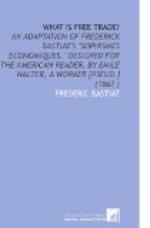Both rest on the principle called Balance of Trade; the formula of which is:
“A people impoverishes itself when it imports, and enriches itself when it exports.”
Of course, if every foreign purchase is a tribute paid, a loss, it is perfectly evident we must restrain, even prohibit, importations.
And if all foreign sales are tribute received, profit, it is quite natural to create channels of outlet, even by force.
Protective System—Colonial System: two aspects of the same theory. To hinder our fellow-citizens purchasing of foreigners, to force foreigners to purchase from our fellow-citizens, are merely two consequences of one identical principle. Now, it is impossible not to recognize that according to this doctrine, general utility rests on monopoly, or interior spoliation, and on conquest, or exterior spoliation.
Let us enter one of the cabins among the Adirondacks. The father of the family has received for his work only a slender salary. The icy northern blast makes his half naked children shiver, the fire is extinguished, and the table bare. There are wool, and wood, and coal, just over the St. Lawrence; but these commodities are forbidden to the family of the poor day-laborer, for the other side of the river is no longer the United States. The foreign pine-logs may not gladden the hearth of his cabin; his children may not know the taste of Canadian bread, the wool of Upper Canada will not bring back warmth to their benumbed limbs. General utility wills it so. All very well! but acknowledge that here it contradicts justice. To dispose by legislation of consumers, to limit them to the products of national labor, is to encroach upon their liberty, to forbid them a resource (exchange) in which there is nothing contrary to morality; in one word, it is to do them injustice.
“Yet this is necessary,” it is said, “under the penalty of seeing national labor stopped, under the penalty of striking a fatal blow at public prosperity.”
The writers of the protectionist school arrive then at this sad conclusion; that there is a radical incompatibility between justice and utility.
On the other side, if nations are interested in selling, and not in buying, violent action and reaction are the natural condition of their relations, for each will seek to impose its products on all, and all will do their utmost endeavor to reject the products of each.
As a sale, in effect, implies a purchase, and since, according to this doctrine, to sell is to benefit, as to buy is to injure, every international transaction implies the amelioration of one people, and the deterioration of another.
But, on one side, men are fatally impelled towards that which profits them: on the contrary, they resist instinctively whatever injures them; whence we must conclude that every people bears within itself a natural force of expansion, and a not less natural power of resistance, which are equally prejudicial to all the others; or, in other terms, that antagonism and war are the natural constitution of human society!




